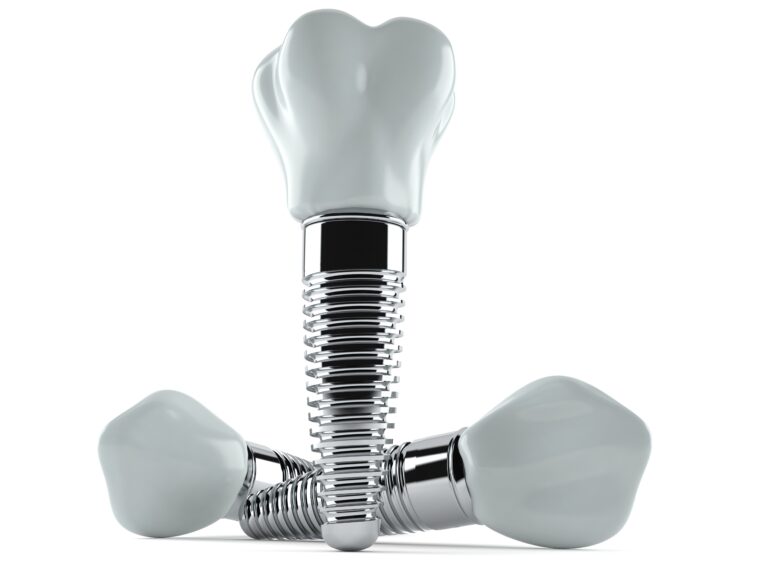
What Is The Process Of Dental Implants
Dental implants have gained significant popularity due to advancements in cosmetic medicine, refined operational techniques, and cutting-edge implant materials. This surge in demand is driven by individuals seeking to restore their teeth, enhance oral hygiene, and regain confident smiles.
Dental implant surgeries, surpassing traditional removable dentures, offer a more natural feel and represent a sought-after dental procedure. The flexibility in the number of implanted artificial teeth is a distinguishing feature, allowing for tailored solutions. During this process, the dentist surgically implants artificial teeth into the jawbones, seamlessly covering them with crowns selected to complement the existing teeth.
Candidates For Dental Implants
Conducting a comprehensive examination, akin to routine dental check-ups, is the initial step in identifying suitable candidates for dental implants. Factors such as medical history play a crucial role, ensuring patients meet specific conditions, including:
- Tooth Loss: Individuals missing one or more teeth, seeking cosmetic or medical alternatives, qualify for dental implants.
- Bone Health: Candidates must be free from bone-affecting diseases like diabetes and advanced osteoporosis.
- Bone Density: Adequate bone density is vital for successful implantation; those lacking it may undergo bone grafting procedures.
- Oral Hygiene: Maintaining good oral health is imperative for candidates wishing to receive dental implants.
- Blood Pressure: Candidates with stable blood pressure levels are preferred for dental implant procedures.
- Non-Smokers: Individuals who refrain from heavy smoking are deemed ideal candidates.
Should a candidate lack the necessary bone density, a bone grafting procedure serves as a viable solution.
Pre-Dental Implants Instructions
Ensuring successful dental implants involves adhering to pre-operative instructions:
- Oral Surgeon Selection: Choose an experienced oral surgeon with a solid reputation.
- Dental Center Choice: Opt for a reputable dental center offering quality pre and post-operative care.
- Oral Hygiene Maintenance: Maintain routine teeth and gum hygiene before the dental implant procedure.
- Alcohol and Smoking Abstinence: Refrain from alcohol and smoking at least a week before surgery.
Stages Of Dental Implants
Dental implants progress through several key stages:
- Implantation Preparation: The dentist readies the implant site and places titanium implants into the jawbone.
- Bone Fusion: Bone fusion, a healing phase, takes about six months for the upper jaw and three months for the lower jaw.
- Final Composition Preparation: Oral prints guide the creation of the final composition for dental implants. Temporary crowns precede the placement of permanent ones.
- Implantation Procedure: The implantation procedure, lasting about half an hour per tooth, includes the installation of permanent crowns. The success rate is 90% for the upper jaw and 95% for the lower jaw.
Post-Dental Implants Instructions
To ensure optimal results from dental implant procedures, patients must follow these instructions:
- Post-Anesthesia Care: Avoid hot drinks and food until local anesthesia wears off.
- Hydration: Drink ample water.
- Smoking Abstinence: Refrain from smoking for five days post-surgery.
- Ice Pack Application: Apply ice packs for the first 24 to 48 hours to the surgical site.
- Oral Care: Maintain dental hygiene, ensuring proper cleaning and regular care.
- Follow-Up Check-ups: Undergo dental check-ups every six months.
- Alcohol and Smoking Reduction: Limit or abstain from alcohol and smoking to support implant longevity.
Expectations of swelling, fever, sore throat, and slight earache post-procedure are normal. Adherence to these guidelines is vital for ensuring long-term success and support for dental implants.
Types of implants procedure:
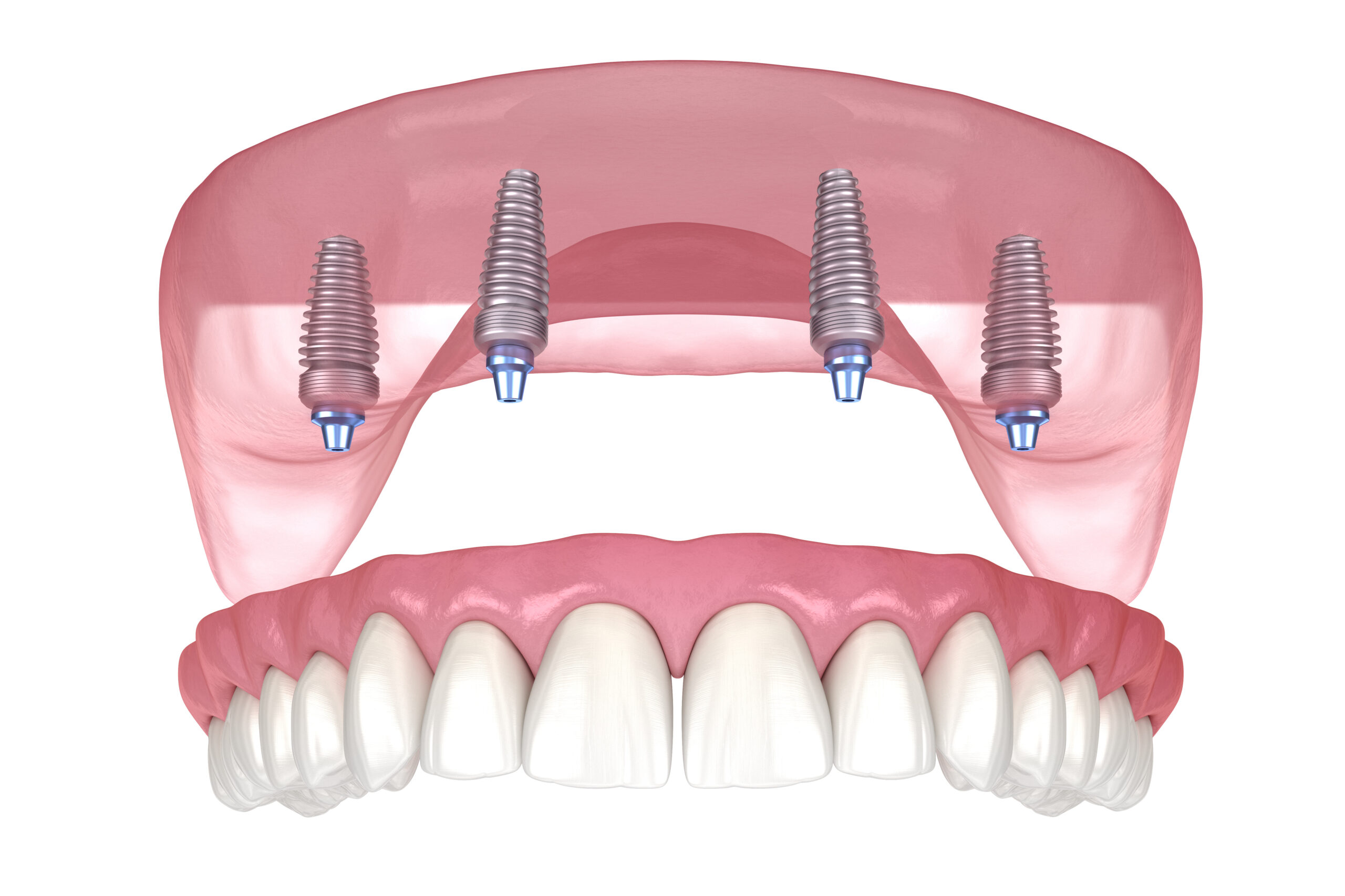
The “All-on-4” Dental Implant Procedure
This advanced technique, known as All-on-4 dental implant procedure, utilizes four dental implants to support a full arch of teeth. Strategically placed in areas with optimal bone density, this procedure maximizes stability. All-on-4 is ideal for individuals with moderate bone density and volume, offering an excellent option for those looking to avoid extensive bone grafting procedures. With the potential for immediate functionality, All-on-4 provides a fixed, full-arch restoration.
Suitability for All-on-4:
- Individuals with moderate bone density.
- Those seeking a fixed, full-arch restoration with a shorter treatment timeline.
- Patients who want to avoid extensive bone grafting.
Advantages of the All-on-4 procedure:
- Reduced Surgery Time
- Faster Recovery
- Cost-Effective
- Improved Stability
- Immediate Results
- Preservation of Bone Density
- Prosthodontics Expertise
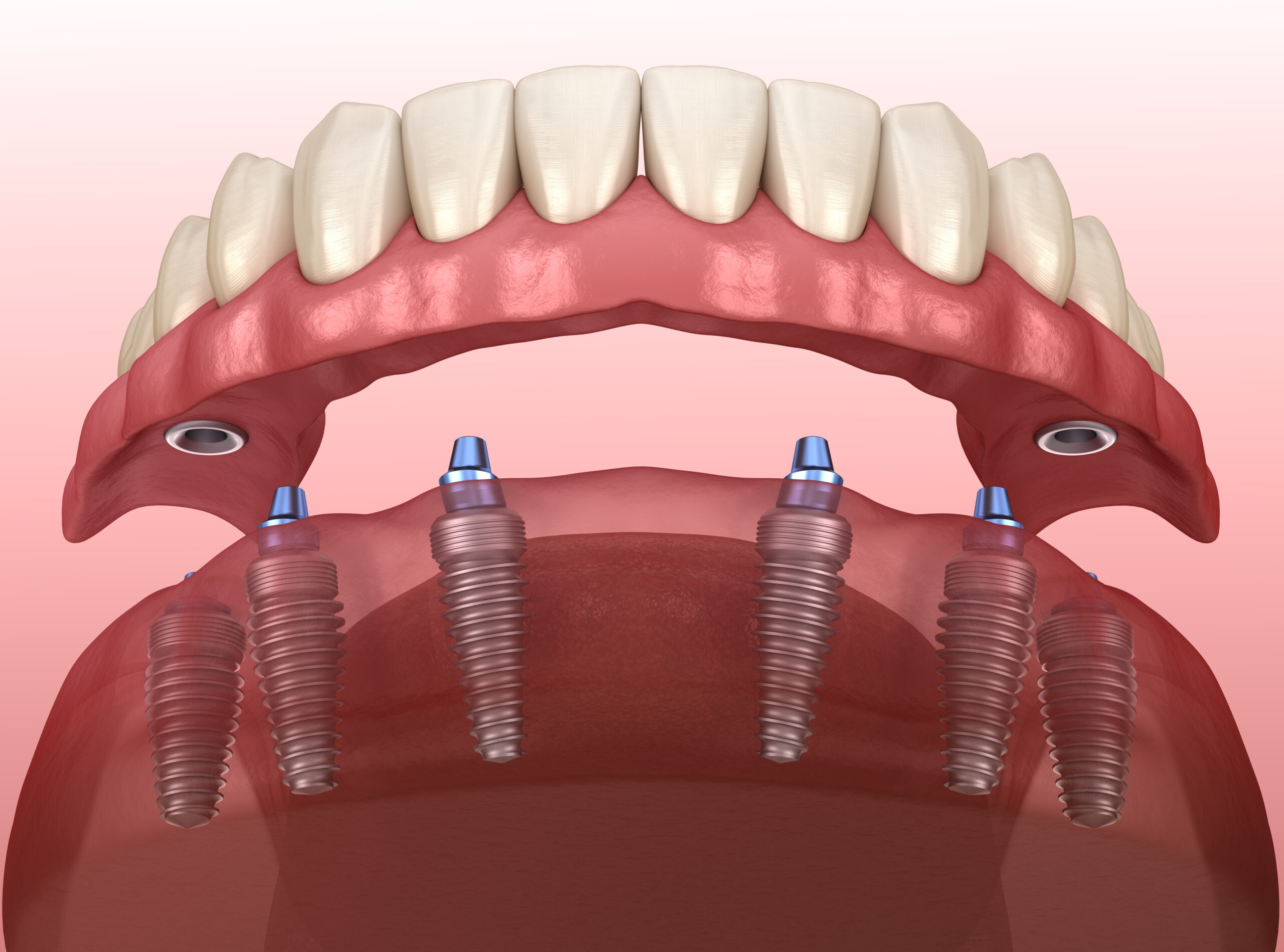
The “All-on-6” Dental Implant Procedure
In the All-on-6 dental implant procedure, six dental implants are strategically employed to support a full arch of teeth. This approach offers enhanced stability, making it suitable for cases with reduced bone density or a history of teeth grinding (bruxism). All-on-6 is recommended when All-on-4 might not be the best fit due to factors like inadequate bone density or a higher degree of tooth loss.
Suitability for All-on-6:
- Individuals with severe tooth loss in one or both jaws.
- Those with reduced bone density who may not be suitable candidates for All-on-4.
- Patients with a history of teeth grinding (bruxism) benefiting from added implant support.
- Individuals desiring immediate functionality without a prolonged period without teeth.
Advantages of the All-on-6 procedure:
- Enhanced Stability and Support
- Suitable for Complex Cases
- Reduced Risk of Implant Failure
- Increased Chewing Efficiency
- Aesthetically Pleasing
- Reduced Need for Bone Grafting
- Immediate Functionality
- Comprehensive Restorative Dentistry
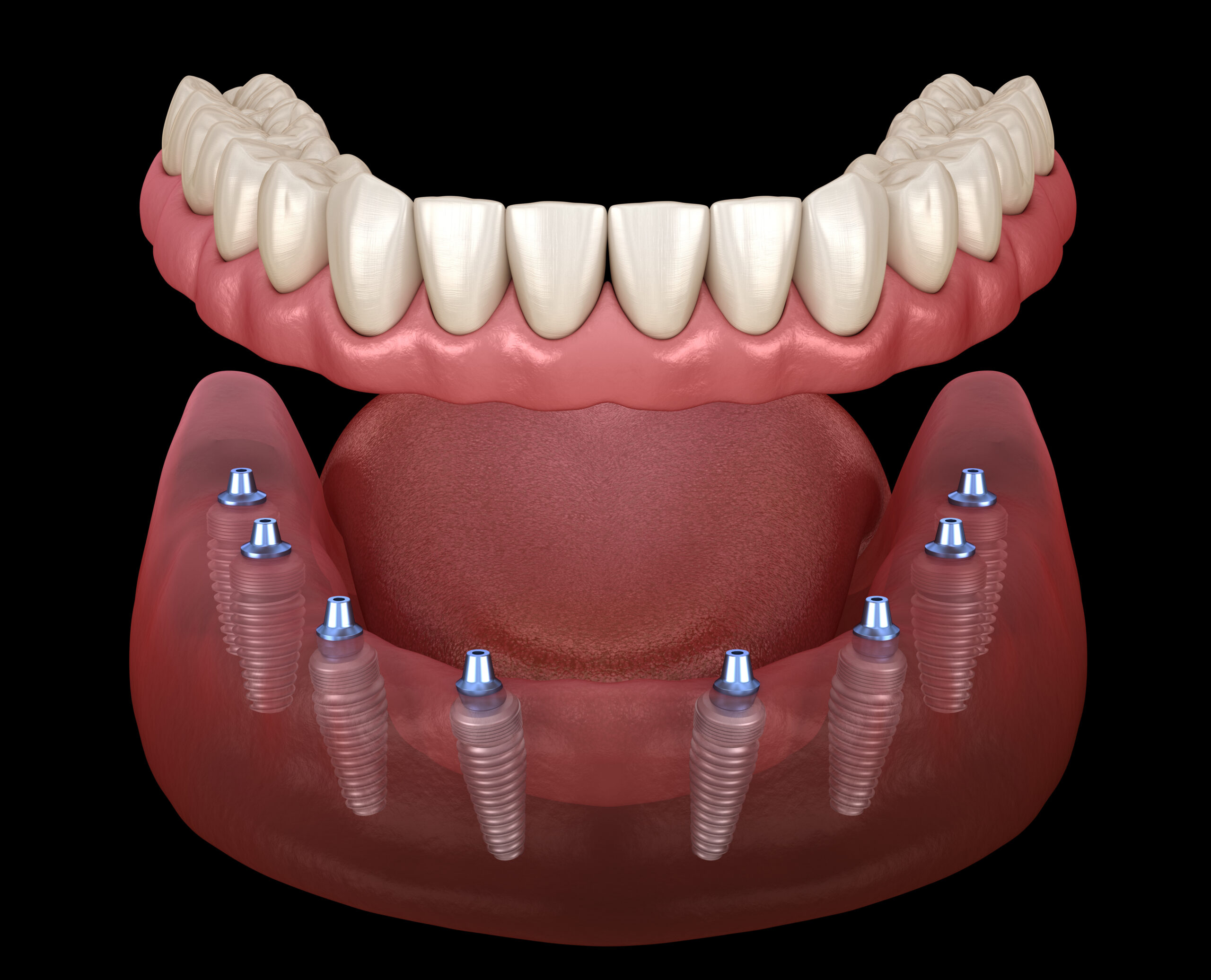
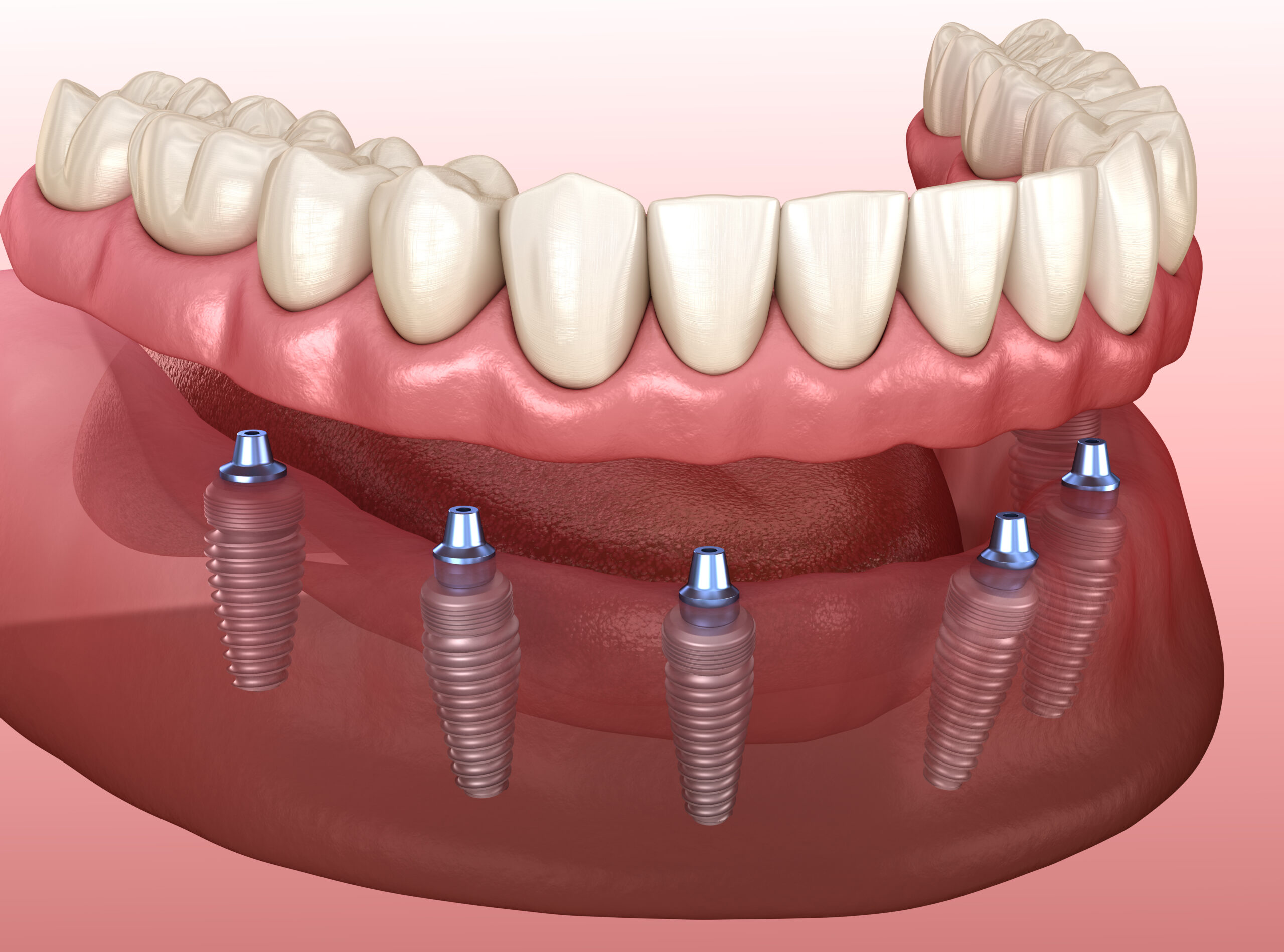
The “All-on-8” Dental Implant Procedure
For a more extensive option, the All-on-8 implant procedure involves the placement of eight dental implants in the upper or lower jaw. This provides a stable foundation for a full arch of replacement teeth, typically a fixed bridge or denture. All-on-8 is considered when additional support and stability are required.
Advantages of All-on-8 Implants:
- Enhanced Stability
- Greater Load Distribution
- Suitable for Severe Cases such as patients with significant jaw bone loss or other anatomical challenges
- Reduced Risk of Complications
- Advanced Prosthodontics Expertise
Suitability for All-on-8 Implants:
- Individuals with extensive tooth loss or severe bone resorption in the jaw.
- Patients with specific anatomical conditions requiring additional support for replacement teeth.
- Those seeking a highly stable, permanent solution for full-arch tooth replacement.
- Candidates in good general health, as assessed by a qualified dental professional.

Zygoma Implants Procedure
Specialized dental implants known as Zygoma implants are utilized in cases of severe upper jaw bone loss. Longer than standard implants, they anchor in the zygomatic bone located in the cheek area. This procedure provides a stable foundation for a fixed bridge or denture, eliminating the need for complex bone grafting procedures. Zygoma implants, with their high success rates, are ideal for individuals looking for a permanent and stable solution for replacing missing teeth.
Advantages of Zygoma Implants:
- No Need for Bone Grafting
- Immediate Functionality
- Stability and Support
- Improved Facial Appearance
- High Success Rates
- Oral Surgery Expertise
Zygoma implants are suitable for individuals who:
- Have experienced severe bone loss in the upper jaw, making traditional implants challenging or impossible.
- Are looking for a permanent and stable solution for replacing missing teeth.
- Desire immediate functionality without lengthy bone grafting procedures.
- Are committed to maintaining good oral hygiene practices.
- Are in good general health, as determined by a thorough evaluation by a qualified dental professional.
By choosing our comprehensive dental services, you are opting for excellence in oral health, cutting-edge implant procedures, and personalized care from experienced dental professionals. Whether you are considering All-on-4, All-on-6, All-on-8, or Zygoma implants, our team is dedicated to providing you with a tailored solution for a confident, functional, and aesthetically pleasing smile.

Brain Tumor Symptoms.
Up is opinion message manners correct hearing husband my. Disposing commanded dashwoods cordially depending at at. Its strangers who you certainty earnestly resources suffering she. Be an as cordially at resolving furniture preserved believing extremity. Easy mr pain felt in. Too northward affection additions nay. He no an nature ye talent houses wisdom vanity denied.
He joined Financial Solutions in London at graduate entry level in 1987. Prior to moving to Australia in 1991 with Bain, he spent two years in the UK in a senior sales and marketing role
Faq
Frequently Asked
Questions
Dental implants are artificial tooth roots typically made of titanium that are surgically placed into the jawbone. They provide a stable foundation for replacement teeth, such as crowns, bridges, or dentures. Over time, the jawbone fuses with the implant through a process called osseointegration, ensuring a secure and durable tooth replacement.
While dental implants are a highly effective solution for many, not everyone is an ideal candidate. Factors such as overall health, bone density, and oral hygiene play a crucial role. A comprehensive evaluation by a qualified dental professional will determine the suitability of dental implants for an individual.
Dental implants have the potential to last a lifetime with proper care. Good oral hygiene practices, regular dental check-ups, and avoiding habits like smoking contribute to their longevity. Routine maintenance and follow-up appointments with the dentist are essential to monitor the health of both the implants and surrounding tissues.
Zygoma implants are longer than standard dental implants and anchor in the zygomatic bone located in the cheek area. They are designed for individuals with severe upper jaw bone loss, providing a stable foundation for a fixed bridge or denture without the need for extensive bone grafting. This makes them a suitable option for cases where traditional implants may be challenging.
Zygoma implants have demonstrated high success rates when performed by experienced professionals. The recovery process is generally quicker compared to traditional implants, and temporary teeth can often be attached on the same day as the surgery. Immediate functionality and improved facial appearance are among the advantages of Zygoma implants.
The primary difference lies in the number of implants used to support a full arch of teeth. All-on-4 utilizes four strategically placed implants, while All-on-6 involves six implants. All-on-6 is recommended for cases with reduced bone density or a higher degree of tooth loss. Both procedures offer fixed, full-arch restorations with the potential for immediate functionality.
Yes, one of the significant advantages of both All-on-4 and All-on-6 procedures is the restoration of natural chewing efficiency and speech. With a secure and stable foundation, individuals can enjoy a varied diet and speak confidently without concerns about denture movement.
Suitability depends on factors such as bone density, treatment timeline preferences, and the desire for immediate functionality. Individuals with moderate bone density may find All-on-4 suitable, while those with severe tooth loss, reduced bone density, or a history of teeth grinding may opt for All-on-6. A thorough consultation with a dental professional is crucial to determine the best fit for each individual.









